 Hi readers, it seems you use Catholic Online a lot; that's great! It's a little awkward to ask, but we need your help. If you have already donated, we sincerely thank you. We're not salespeople, but we depend on donations averaging $14.76 and fewer than 1% of readers give. If you donate just $5.00, the price of your coffee, Catholic Online School could keep thriving. Thank you. Help Now >
Hi readers, it seems you use Catholic Online a lot; that's great! It's a little awkward to ask, but we need your help. If you have already donated, we sincerely thank you. We're not salespeople, but we depend on donations averaging $14.76 and fewer than 1% of readers give. If you donate just $5.00, the price of your coffee, Catholic Online School could keep thriving. Thank you. Help Now >
Can the Church foster peace in the Holy Land?
FREE Catholic Classes
As conflict has erupted once again between Israelis and Palestinians in East Jerusalem, the Latin Patriarchal Vicar said that the Catholic Church has a unique role to play in bringing about justice and peace.

Highlights
Catholic Online (https://www.catholic.org)
7/27/2017 (6 years ago)
Published in Middle East
Keywords: Palestine, Israel, East Jerusalem, Temple Mount, Haram al-Sharif, Al-Aqsa Mosque
Jerusalem (CNA/EWTN News) - "When two religious communities lay claim to the same area, we have a recipe for disaster, particular when members of the two communities are also involved in a political, territorial and historical conflict," Fr. David M. Neuhaus told CNA July 24.
"The Church has a very special vocation in Israel/Palestine. Without power of any kind, the Church is free from playing political games and can be a voice that speaks out for truth, justice and peace."
The Church has important assets "to contribute to building a reality of justice and peace instead of the war and violence that dominate," he said.
The site known to Jews as the Temple Mount and to Muslims as Haram al-Sharif, where the al-Aqsa Mosque is located, was the scene of another round of violence last week when Israeli authorities installed metal detectors at the entrances of the mosque.
Palestinian objection to the metal detectors manifested in mass protests and escalated to include the killing of three Israelis at a Jewish settlement July 21. Four Palestinians were killed in East Jerusalem and the West Bank.
The controversial metal detectors were removed by Israeli security forces early Tuesday morning.
Fr. Neuhaus said that it can be very difficult to discern what is true and false in the conflict because each side has its own vision of what is happening.
"Why is it so difficult to find a solution to this conflict? Perhaps one part of the difficulty is that each one of the two sides believes in the total justice of its cause and is unwilling to listen with empathy to the other side," he said.
In the face of these clashes, the Church's political neutrality has an important role to play, stemming from two important assets, he emphasized.
"One is the Church's way of speaking, formulating words carefully, words that are built on truth, that teach respect and that promote justice and peace. This language is not diplomatic but rather language that works for reconciliation in the respect of truth."
The second comes from the Church's "vast network" of institutions, including schools, universities, hospitals, and homes for the elderly, orphans, the handicapped, and more, he said.
"In these institutions, the discourse of the Church is incarnated as the institutions serve one and all with no discrimination, showing that coexistence in mutual respect is not only possible but is the way forward that can open up the future, offering hope for the next generation."
We ask you, humbly: don't scroll away.
Hi readers, it seems you use Catholic Online a lot; that's great! It's a little awkward to ask, but we need your help. If you have already donated, we sincerely thank you. We're not salespeople, but we depend on donations averaging $14.76 and fewer than 1% of readers give. If you donate just $5.00, the price of your coffee, Catholic Online School could keep thriving. Thank you.Help Now >
In the current controversy, Israel maintains it installed the metal detectors as a safety measure after three Arab Israeli gunmen smuggled homemade machine guns into the al-Aqsa Mosque July 14, shooting and killing two Israeli policemen.
Palestinians claim the metal detectors were a way for Israel to enact more control over access to the site, which is governed by a status quo arrangement which Israel has said it will maintain.
East Jerusalem has been occupied by Israel since its victory in 1967's Six-Day War.
Israelis seem to live in perpetual fear and Palestinians in unrelenting anger, Fr. Neuhaus said. "Unfortunately, those who speak the language of reason and understanding are unable to garner the support of the masses, who buy into the simplistic slogans of the dominant political elites."
The political authority in Israel "repeats that it is not changing the status quo and insists on this particularly in front of the international community," Fr. Neuhaus said.
But at the same time, there are radicals in Israel "who explicitly endorse a change in the status quo" and have been supported in instances by government ministries.
"The central problem is not restricting access to Al-Aqsa but rather the fear that the Israelis seek to replace Al-Aqsa with a Jewish Temple."
"Any change to the status quo, however minor, is perceived as preparation for a hidden master plan that Palestinians (and the entire Muslim world) formulate as their worst nightmare. The Israelis are fully aware that this is the case as every threat to the status quo has erupted in similar violence in the past."
Though the status quo for Christians and their holy places (like the Church of the Holy Sepulchre) is less threatened, the conflict between Palestinians and Israelis only serves to worsen the political divide already present among Christians -- split between those who are Arabs and thus form one with their Muslim brothers and sisters, and those integrated with the Jewish side.
"Nonetheless, Jewish extremists have manifested their refusal to coexist with Christians in the Holy Land through attacks on churches and other Christian holy sites," Fr. Neuhaus explained.
Because Christians only make up 2-3 percent of the overall population, they are particularly vulnerable under the ongoing instability and violence, he continued, but "Christians are determined to struggle for full integration in their society, whether Palestinian or Israeli, demanding equal rights and mutual respect."
"In times of conflict, the Christians are even more insistent in their prayers for peace."
We ask you, humbly: don't scroll away.
Hi readers, it seems you use Catholic Online a lot; that's great! It's a little awkward to ask, but we need your help. If you have already donated, we sincerely thank you. We're not salespeople, but we depend on donations averaging $14.76 and fewer than 1% of readers give. If you donate just $5.00, the price of your coffee, Catholic Online School could keep thriving. Thank you.Help Now >
Miguel Perez Pichel contributed to this report.
Subscribe Now - Catholic Online YouTube
---
'Help Give every Student and Teacher FREE resources for a world-class Moral Catholic Education'
Copyright 2021 - Distributed by Catholic Online
Join the Movement
When you sign up below, you don't just join an email list - you're joining an entire movement for Free world class Catholic education.
-

-
Mysteries of the Rosary
-
St. Faustina Kowalska
-
Litany of the Blessed Virgin Mary
-
Saint of the Day for Wednesday, Oct 4th, 2023
-
Popular Saints
-
St. Francis of Assisi
-
Bible
-
Female / Women Saints
-
7 Morning Prayers you need to get your day started with God
-
Litany of the Blessed Virgin Mary
Understanding Pentecost: A Celebration of the Holy Spirit in the Catholic Tradition
-

Did you know the Catholic Church has a birthday?
-

Catholic Bishops Call for Civil Dialogue Amid Church Polarization
-
Pope Francis Emphasizes Charity as the Pinnacle of Christian Love
-
Discovering the Heart of Love: Pope Francis Shares Wisdom on Charity
Daily Catholic
 Daily Readings for Friday, May 17, 2024
Daily Readings for Friday, May 17, 2024 St. Paschal Baylon: Saint of the Day for Friday, May 17, 2024
St. Paschal Baylon: Saint of the Day for Friday, May 17, 2024 Prayer to St. Gabriel, for Others: Prayer of the Day for Friday, May 10, 2024
Prayer to St. Gabriel, for Others: Prayer of the Day for Friday, May 10, 2024- Daily Readings for Thursday, May 16, 2024
- St. Simon Stock: Saint of the Day for Thursday, May 16, 2024
- Prayer for Travelers: Prayer of the Day for Thursday, May 09, 2024
 Hi readers, it seems you use Catholic Online a lot; that's great! It's a little awkward to ask, but we need your help. If you have already donated, we sincerely thank you. We're not salespeople, but we depend on donations averaging $14.76 and fewer than 1% of readers give. If you donate just $5.00, the price of your coffee, Catholic Online School could keep thriving. Thank you. Help Now >
Hi readers, it seems you use Catholic Online a lot; that's great! It's a little awkward to ask, but we need your help. If you have already donated, we sincerely thank you. We're not salespeople, but we depend on donations averaging $14.76 and fewer than 1% of readers give. If you donate just $5.00, the price of your coffee, Catholic Online School could keep thriving. Thank you. Help Now >
![]()
Copyright 2024 Catholic Online. All materials contained on this site, whether written, audible or visual are the exclusive property of Catholic Online and are protected under U.S. and International copyright laws, © Copyright 2024 Catholic Online. Any unauthorized use, without prior written consent of Catholic Online is strictly forbidden and prohibited.
Catholic Online is a Project of Your Catholic Voice Foundation, a Not-for-Profit Corporation. Your Catholic Voice Foundation has been granted a recognition of tax exemption under Section 501(c)(3) of the Internal Revenue Code. Federal Tax Identification Number: 81-0596847. Your gift is tax-deductible as allowed by law.

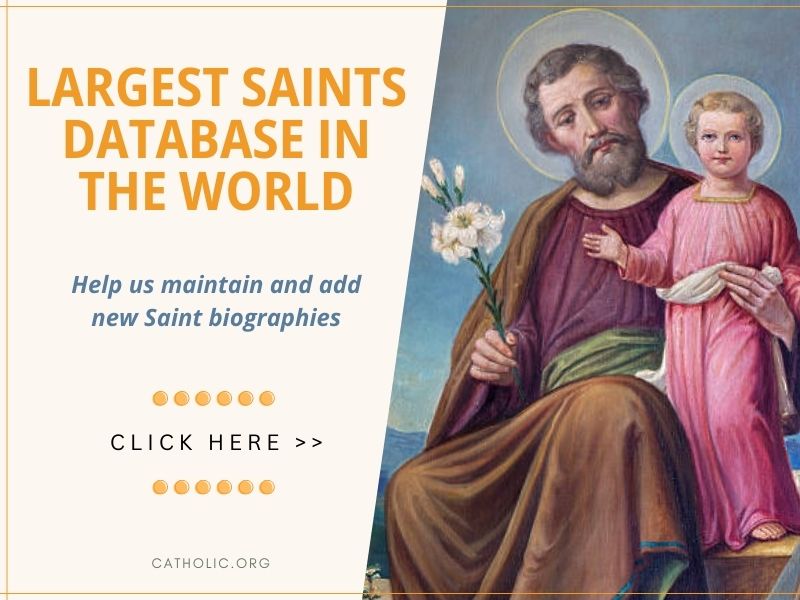



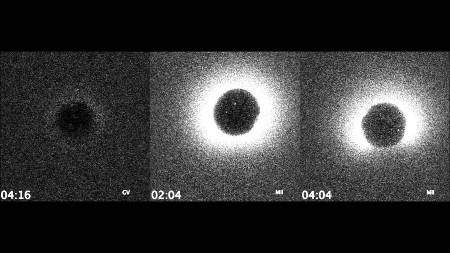
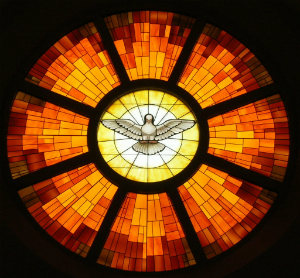
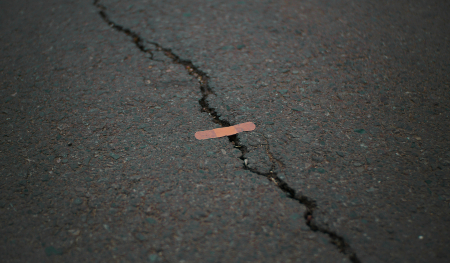
 Daily Readings for Friday, May 17, 2024
Daily Readings for Friday, May 17, 2024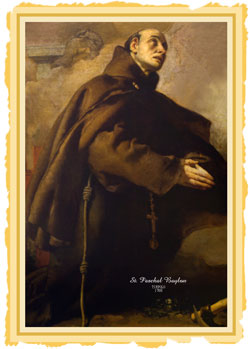 St. Paschal Baylon: Saint of the Day for Friday, May 17, 2024
St. Paschal Baylon: Saint of the Day for Friday, May 17, 2024 Prayer to St. Gabriel, for Others: Prayer of the Day for Friday, May 10, 2024
Prayer to St. Gabriel, for Others: Prayer of the Day for Friday, May 10, 2024
